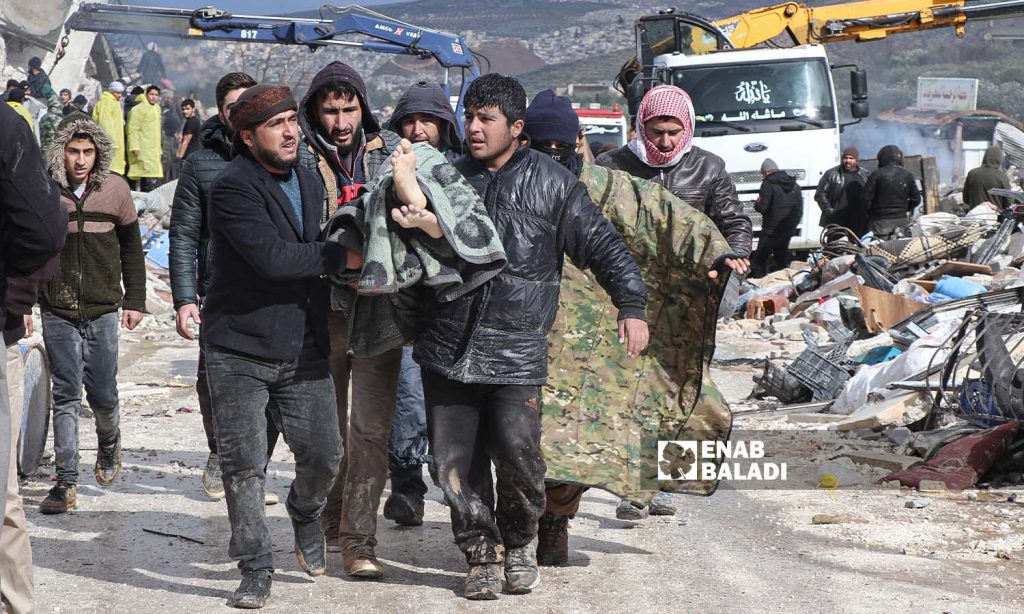Except for specific cases, the border crossings between Syria and Turkey are still closed following the powerful 7.8 magnitude earthquake that rocked wide swaths of Turkey and Syria on Monday, killing more than 5,000 people.
Local officials told Enab Baladi that no international aid has reached northwestern Syria in the absence of any alternative ways for aid to enter due to damage to roads and other logistical issues related to the deadly earthquake.
The crossings did not open until the time this report was published in front of the critically injured cases, towards Turkey, amid the work of all hospitals in northern Syria at their maximum capacity and their weak capabilities resulting from the lack of support and funds.
Mazen Alloush, a press officer at the Bab al-Hawa border crossing, confirmed to Enab Baladi that no aid had entered through the crossing into northern Syria, explaining that the crossing was closed on Monday in both directions for all travelers and trucks.
The Turkish side also did not receive any of the emergency medical cases for patients affected by the earthquake through the crossing, he added.
The Bab al-Hawa crossing also announced the cessation of the transit of patients from the north to Turkey in all categories (emergency cases, non-emergency cases, and reviews in Turkish medical facilities) until further notice.
However, the funerals and the departure of patients carrying touristic residence permits from Turkey to Syria are still possible, according to a statement published today, Tuesday, 7 February.
Journalist Hassan Qabso also confirmed to Enab Baladi that the Bab al-Salama border crossing with Turkey is not functioning, and people crossing through it are limited to those who have permission to enter and exit from and to Turkey and on foot only.
Also, no aid entered through the Bab al-Salama crossing until the time this news was published, according to Qabso.
All Syrian governorates have been suffering for years from a severe crisis in the medical sector as a result of the loss of many types of medicines and medical equipment due to the lack of support provided to the facilities on the one hand and the existence of an acute shortage of specialized medical personnel in order to meet the needs of the region on the other hand.
Quake halts UN cross-border aid
“The flow of critical UN aid from Turkey to northwest Syria has temporarily halted due to damage to roads and other logistical issues related to the deadly earthquake that struck the two countries on Monday,” Madevi Sun-Suon, spokesperson for the United Nations Office for the Coordination of Humanitarian Assistance (OCHA), told Reuters.
“Some roads are broken, some are inaccessible. There are logistical issues that need to be worked through,” Sun-Suon added.
Even before the quake struck in the early hours of Monday, the UN estimated that more than 4 million people in northwest Syria, many displaced by the war and living in camps, depended on cross-border aid, according to Reuters.
Airports located in the areas of influence of the Syrian regime receive aid and rescue teams from allied countries, such as Iran and Russia, or that have relations with the regime, such as Iraq and Algeria.
In the meantime, rescue and search teams continue to come to Turkey, from different countries, in addition to countries, organizations, and international bodies announcing their support in search and rescue and sending teams in this regard to Turkey, such as the UN, the EU, and NATO.
In the latest statistics issued by the Syria Civil Defense (SCD) teams, the death toll from the earthquake in northwestern Syria has risen to more than 900 deaths and more than 2,300 injured, with the number expected to increase “significantly” due to the presence of hundreds of families under the rubble and the occurrence of aftershocks.
The SCD appealed to international bodies and humanitarian organizations to urgently help the earthquake victims, stressing that time is running out and hundreds of families are still stuck under the rubble.
The rescue agency indicated that the search operations continued for more than 29 hours, with more than 210 buildings completely demolished, more than 520 partially destroyed, and thousands of buildings and homes cracked due to the earthquake and multiple aftershocks.
According to the latest statistics of the regime’s health ministry, the death toll in regime-held areas reached a total of 812, while 1,449 people have been injured.











